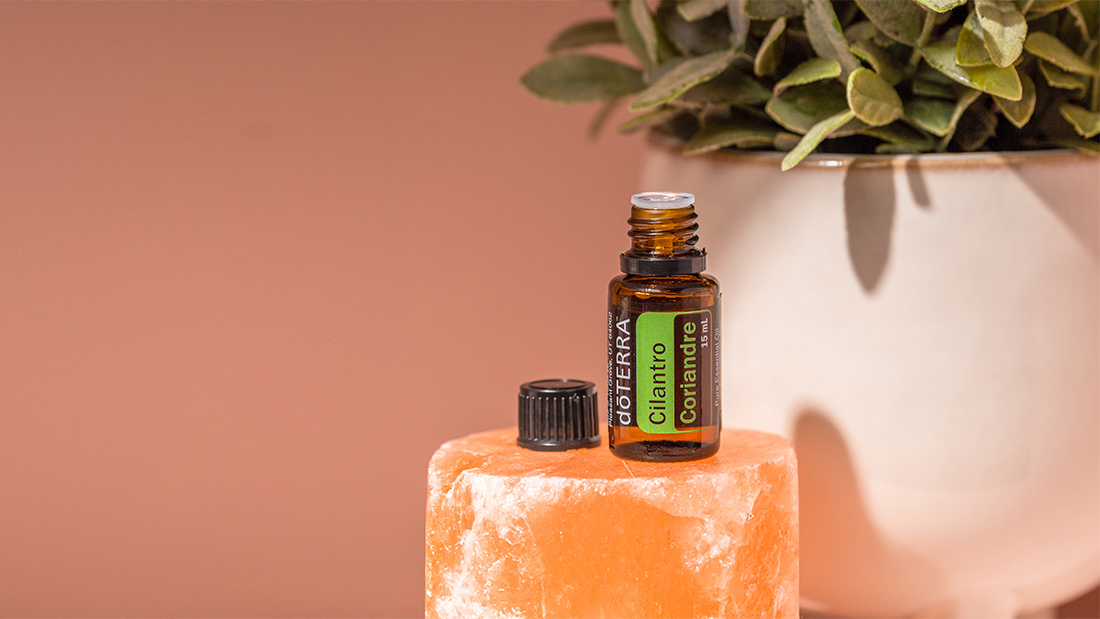Origin: a Latin derivative
meaning "Gift of the Earth."
Cilantro Oil Uses and Benefits

Cilantro Oil Product Description
The cilantro herb is considered a champion in the culinary world for the way it enhances the taste and flavour of your favourite dishes, but as an essential oil, it has even more uses and benefits to admire. Cilantro essential oil is the perfect substitute for dried or fresh cilantro and is used to flavour meats, salads, and dips. Because it contains the chemical constituent, linalool, Cilantro oil can have a soothing effect on the skin and has surface cleansing properties when used topically. Cilantro oil can also improve the appearance of healthy nails, elevate your oral hygiene routine, and produces a cooling sensation to the skin when added to a massage. With its fresh, herbal aroma and versatility, Cilantro essential oil is an absolute must to add to your collection.
How do I use Cilantro Oil?
- Cooking: The fresh, herbal taste of Cilantro essential oil makes it perfect for cooking. Add a couple of drops of Cilantro oil to your favourite guacamole, salsa, or dip recipe for a tasty bite, or try this recipe for Spring Green Juice for a refreshing beverage with a dash of Cilantro flavour.
- Nailcare: The cleansing properties of Cilantro essential oil can help with the maintenance of your cuticles and fingernails. Simply apply one drop of Cilantro oil to your fingernails and toenails daily or after showering to keep them looking healthy and clean.
- Skincare: Give your skin the royal treatment by adding one drop of Cilantro oil to your favourite hand and body lotions to help soothe and moisturize dry skin, leaving behind an invigorating, sweet aroma.
- Oral Hygiene: Practice good oral hygiene by adding one drop of Cilantro essential oil to your daily mouth rinse for a cleansing boost and to freshen your breath.
- Massage: For a cooling and soothing sensation during a massage, simply combine one to two drops of Cilantro oil with Fractionated Coconut Oil. Gently rub into your skin and enjoy the sweet, herbal aroma.
- Evening Meditation: As you wind down for the day with your evening meditations, add one drop of Cilantro essential oil to the bottoms of your feet to create a peaceful and refreshing aroma before bed.
- Diffusion: Keep your home or office space smelling fresh by adding two drops of Cilantro essential oil to the diffuser of your choice and enjoy the refreshing, sweet, herbal aroma, or combine with your favourite citrus oil blend for an energizing, herbal citrus twist.
Fun Fact
All parts of the cilantro plant are edible. The cilantro leaves and seeds of the plant are known as coriander, and are often used as spices in Latin American, Asian, and American cuisine, while the coriander root is used in Thai dishes.
What is Cilantro Oil?
The cilantro plant, Coriandrum sativum, is an annual herb plant that originates in the Middle East with small, green, feathery leaves. It produces small, yellow-brown, oval shaped fruit that holds two seeds. If the cilantro plant starts to become overgrown, tiny, white, umbrella shaped flowers will bloom, causing the leaves to lose their trademark flavour. To produce Cilantro essential oil, the leaf and stem go through a process of steam distillation where a combination of heated steam and gentle pressure is used to create this treasured, herbal oil.
What Essential Oils blend well with Cilantro Oil?
Cilantro essential oil blends well with citrus oils such as Bergamot oil, Lemon oil, and Marjoram oil as well as other herb and spice oils like Black Pepper oil, Coriander oil, Basil oil, and Cinnamon Bark oil. The fresh herbal aroma of Cilantro oil also pairs nicely with floral oils such as Ylang Ylang oil, Clary Sage oil, and Geranium oil.
Cautions
Possible skin sensitivity. Keep out of reach of children. If you are pregnant, nursing, or under a doctor’s care, consult your physician. Avoid contact with eyes, inner ears, and sensitive areas.



